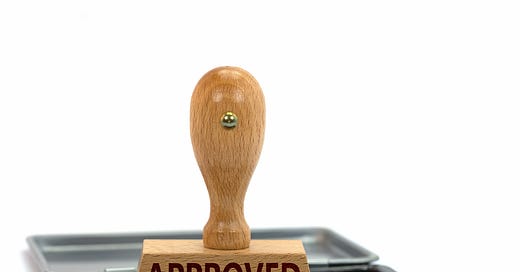IL VGT Operator Gets Into The Casino Biz
Accel Entertainment has been approved to purchase the former Fairmount Park racetrack and plans to turn it into a land-based casino.
The Bulletin Board
NEWS: Illinois' online casino efforts receive some good news, as a VGT operator is set to purchase a land-based casino.
WEEKEND CATCHUP: Missouri sports betting initiative gets expensive; Freehold closing after 170 years; NV smoking ban; Quote of the Week
NEWS: The best argument against the SAFE Bet Act was made during an iDEA Growth webinar last week.
VIEWS: The DC Circuit Court of Appeals hears arguments in the Kalshi vs. CFTC election betting lawsuit.
AROUND the WATERCOOLER: Understanding the gambler’s mindset.
STRAY THOUGHTS: Corrosion takes time.
SPONSOR’S MESSAGE - Sporttrade was borne out of the belief that the golden age of sports betting has yet to come. Combining proprietary technology, thoughtful design, and capital markets expertise, our platform endeavors to modernize sports betting for a more equitable, responsible, and accessible future.
Sporttrade’s newest feature, The Tape, prints all trades made on the app in real-time.
Accel Purchase of Fairmount Park Good News for iCasino?
It may not seem like a big deal, but the sale of the former Fairmount Park racetrack to VGT operator Accel Entertainment could be the catalyst for bringing online casinos to Illinois.
Per Bloodhorse, “The Illinois Racing Board has approved the acquisition of FanDuel Sportsbook and Horse Racing, the former Fairmount Park, by Accel Entertainment.”
Accel holds a VGT license but still needs approval from the Illinois Gaming Board for a casino license.
Speaking to the IRB on September 19, Accel president of United States gaming Mark Phelan said the $35 million acquisition cost will be backed up with $85-$95 million in construction of the temporary casino and a permanent facility, per Bloodhorse.
The temporary casino will house 200 slot machines and up to a half dozen gaming tables.
So why does a $35 million racetrack purchase matter? The biggest hurdle to online casinos in Illinois is the entrenched VGT industry. VGT opposition may erode if one of the major operators is suddenly in line to be a master online casino license holder.
Another flailing racetrack, Hawthorne, could provide a similar path for a VGT operator if they wanted to follow Accel’s lead.
Illinois is an intriguing online casino candidate. The state was an early adopter of online lottery and legalized mobile sports betting in 2019. However, its thriving VGT industry has long opposed online casino expansion.
According to several industry sources, “online gambling is a no-go without the VGT industry’s approval.” Accel’s purchase of a land-based casino (which places it in line for an online license should Illinois go down that road) is far from a golden ticket, but it does provide a glimmer of hope.
Weekend Catchup: MO Sports Betting Gets Expensive; Freehold Closing; NV Smoking Ban; Quote of the Week
Missouri sports betting campaign is getting expensive: DraftKings has infused the Winning for Missouri Education effort to bring legal sports betting to the state with another $5 million, bringing the group’s funding total to $16.5 million. However, as reported last week, Caesars just infused the countermovement with $4 million. Yes, that’s a 4-1 advantage, but as I’ve noted, the no side is always an easier case to make.
Freehold Raceway announces closure: Freehold Raceway, the oldest racetrack in America, is closing its doors at the end of the year. “This was an extremely difficult decision, especially given the historical importance of Freehold Raceway to the local community and the New Jersey horse racing industry,” track general manager Howard Bruno said in a statement. “Unfortunately, the operations of the racetrack cannot continue under existing conditions, and we do not see a plausible way forward.” The racetrack opened in 1854.
Nevada group pushes for smoking ban: In an open letter Thursday to the Nevada Gaming Commission, Americans for Nonsmokers’ Rights said, “While we applaud (the gaming industry’s) commitment to responsible gaming, a major blind spot remains because too many casinos continue to allow indoor smoking at their properties. Allowing smoking on gaming floors not only poses significant health risks to workers and patrons alike, it also undermines responsible gaming by encouraging addictive behavior as well as prolonged gambling sessions without taking breaks — a fundamental tenet of responsible play.” As STTP has been reporting, smoking bans are hot-button issues in Pennsylvania and New Jersey.
Previous coverage of smoking prohibition efforts (New Jersey and Pennsylvania)
Quote of the Week: "Everyone I know bets.” “Nine out of ten guys at Mizzou bet.” ~ University of Missouri students
SPONSOR’S MESSAGE - Underdog: the most innovative company in sports gaming.
At Underdog we use our own tech stack to create the industry’s most popular games, designing products specifically for the American sports fan.
Join us as we build the future of sports gaming.
Visit: https://underdogfantasy.com/careers
Panel Discusses What’s Next for Sports Betting During iDEA Growth Webinar
Vixio’s Matt Carey moderated a terrific panel on the next phase of US sports betting during the iDEA Growth’s Power Lunch Summit webinar on Thursday.
All three webinars are available to view here: https://ideagrowth.org/webinars/
Joining Carey on Thursday were:
Corey Fox, the VP of Government Affairs at FanDuel
MA State Rep. David Muridian Jr.
David Rebuck, the former director of the NJ DGE
One of the big topics was the SAFE Bet Act, which took up the first 30-plus minutes of the webinar and will be the focus of this entry. The second half of the webinar focused on the next era of state-level regulatory changes as the industry evolves, and it is definitely worth listening to.
The argument is that leaving it to the states is the best way to regulate sports betting, and the way the SAFE Bet Act was introduced is a slap in the face to state lawmakers and regulators.
As David Rebuck said, it’s “mindboggling” that the federal government would come to New Jersey and argue that even though New Jerseans voted for it by a two-to-one margin in 2011, “We know better than you and all your voters. They really don't know what they want, and they made a mistake.”
Rebuck is talking about the requirement to have your sports betting law approved by the Attorney General.
FanDuel’s Corey Fox made a very good point that the bill's structure sets up a system whereby the states would have to establish certain minimum controls and then go to the Justice Department to get approval. But as he notes, “There's a lot of nuance to all those controls, and what's appropriate now might not be appropriate in six months or a year or 18 months.”
As Carey put it, “We all agree that this particular bill, in this particular year, isn’t going anywhere,” but some of the bill's reforms are being discussed in different locales.
STTP Thoughts: I understand the desire to pick the SAFE Bet Act apart (it’s an easy exercise) and the ease of dismissing a federal bill out of hand (Congress can’t even pass a budget), but as I’ve said in the past, no one is going to lose sleep if the sports betting industry is restricted in different ways — from advertising to targeting customers to restricting different betting options.
Is this version of the SAFE Bet Act a threat? Probably not. However, a revamped SAFE Bet Act that eliminates any constitutional concerns could be a significant threat in 2025 or beyond. Especially if the industry’s self-inflicted wounds continue.
Further, even if the bill and its successor bills never go anywhere, they still pose a more existential threat, as their mere presence could slow state-level efforts, just as Sheldon Adelson’s “gimmicky” Restoration of America’s Wire Act bills did for many years.
Appeals Court Skeptical of Election Betting Arguments
The fate of election betting markets is in the hands of a three-judge panel at the United States Court of Appeals for the D.C. Circuit. The court heard arguments from both sides in a two-and-a-half-hour hearing last week, but when it might render a decision is unclear.
“The United States Court of Appeals for the D.C. Circuit heard an appeal by the U.S. Commodities and Futures Trading Commission, which is trying to prevent New York startup company Kalshi from resuming offering bets on the outcome of this fall’s congressional elections.”
So, what did court watchers think of the proceedings? Indiana University law professor John Holden had some thoughts:
CoinDesk, which falls on the pro-election-betting side, felt similarly but extended the skepticism to both sides:
“During the 2.5-hour hearing, the judges did not seem especially impressed by either party, saying various arguments or explanations did not make sense and drilling into specific terms of the Commodity Exchange Act and what they mean.”
Stay tuned…
SPONSOR’S MESSAGE - Join 100s of operators automating their trading with OpticOdds.
Real-time data. Proven trading tools. Built by experts. Meet us at SBC Lisbon & G2E Vegas. Join top operators at www.opticodds.com.
Around the Watercooler
Social media conversations, rumors, and gossip.
A recent column by Jamie Salsburg explains why I consider him to be the most creative person in the RG-PG space. In the column, Salsburg explains the two cycles young gamblers go through:
“For most, gambling starts off small. It might begin as fun—a few bets here and there, often with friends.
“But then comes the first rough stretch of losses… From a financial standpoint, the losses are typically in the $1,500 to $3,000 range, and it hits hard.”
Salsburg then explains the pivotal moment that occurs for some: the bailout.
“Parents often bail them out financially and, in some cases, push them to seek further help. But here’s the thing: most gamblers in this phase haven’t fully learned the lesson.”
And that, according to Salsburg, is where the real trouble begins.
“Fast forward to the mid-to-late twenties, and the stakes have risen. What starts as a few losses in the early twenties grows into something much larger. At the end of this cycle, gamblers are no longer dealing with a few thousand in debt—they’re grappling with amounts closer to $20,000, $50,000, or even $150,000.”
“It’s at this point that the gamblers recognize just how far behind they are falling and the pressure to catch up pushes them further into gambling… Gamblers at this stage are no longer just playing for fun—they’re playing to dig themselves out of a hole and the house of cards they have created begins to fall. Eventually, the weight of it all becomes too much.”
As Salsburg put it in a tweet:
Most voted no, but that just demonstrates that many people in the RG-PG field don’t understand the gambler’s mindset.
As Barry Greenstein said in Ace on the River:
“I wasn’t broke, but I was cash-poor. I had an arrangement with a bookie. I would pay him $25,000 a week when I lost betting sports with him… The bookie didn’t mind if I owed him money because he knew I would continue betting as I tried to get even. I once lost $500,000 in a single month. Meanwhile, Ted Forrest and I played Chinese Poker after Stud games. Over a period of a month and a half, I had lost $1.5 million.“I didn’t have the money… I owed the bookie, and I wrote markers at the casino to my maximum credit limit.”
Greenstein goes on to say that he was a regular donor to a charity called Children Incorporated. One of the coordinators said, “You must be a wealthy man,” to which Greenstein replied, “Actually, I’m a negative millionaire, but giving away $1,000 has no impact on my financial situation.
Stray Thoughts
Corrosive. That is the effect the never-ending barrage of negative sports betting stories is having on the public’s attitudes towards gambling.
Each incident is a minor issue in and of itself, but over time, they add up. Like a small hint of rust on a saw, left ignored or unaddressed, it will quickly corrode every inch of metal.








